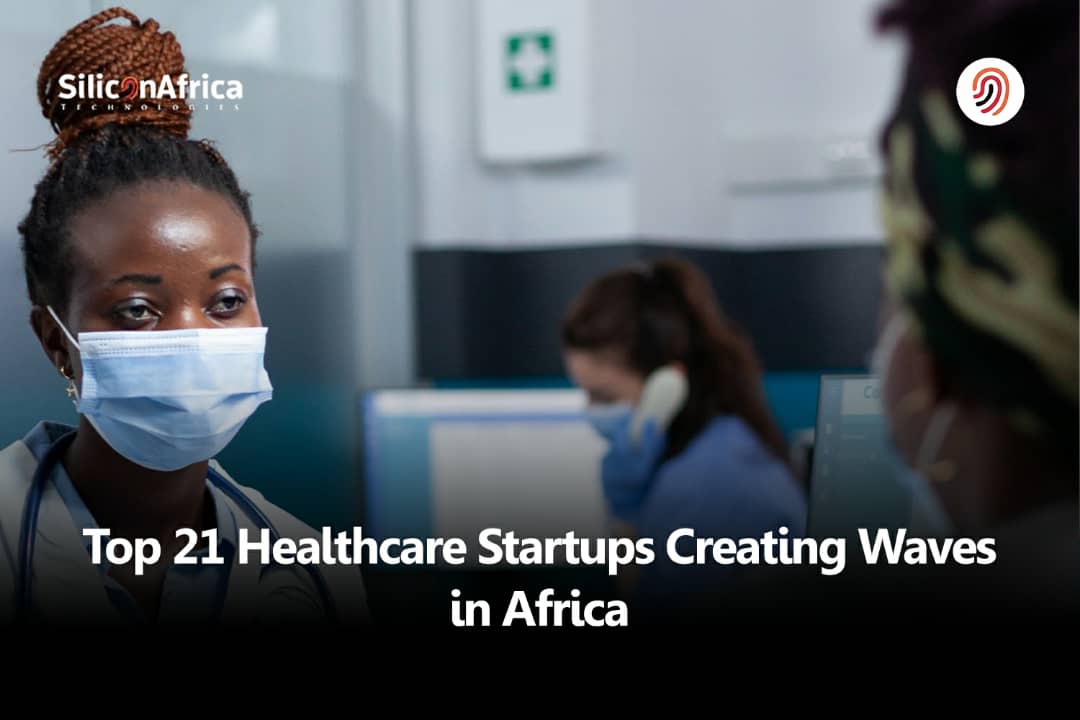Physical Address
60 Ekwema Cres, Layout 460281, Imo
Physical Address
60 Ekwema Cres, Layout 460281, Imo

The health-tech startup landscape in Africa experienced a significant boost in funding and company growth, largely driven by the impact of the pandemic.
For example, 54Gene, founded by Dr. Abasi Ene-Obong, secured substantial investment to bridge the genomics data gap for African populations.
At the same time, mPharma, led by Gregory Rockson, expanded its e-prescription network across multiple countries.
These startups exemplify how the pandemic has accelerated innovation and investment in the African health-tech sector. In this post, we will look at the top healthcare startups that are making waves across Africa.
The African continent has long faced numerous healthcare challenges, including limited access to essential services, a shortage of qualified medical personnel, and inadequate infrastructure.

However, the rise of health-tech startups is changing this narrative. These startups leverage technology to improve healthcare delivery, breaking barriers and enhancing access and quality for millions across the continent.
Despite their challenges, they are making significant strides in transforming the healthcare sector.
In this article, we will explore some innovative healthcare startups revolutionizing the industry through technology.
Also read: Huawei Launches Job Recruitment Drive for Graduates in Kenya
Innovative healthcare startups across Africa are revolutionizing the industry by addressing various challenges such as diagnostics, doctor discovery, and patient care.
These startups leverage technology to provide accessible and affordable solutions, ensuring better healthcare delivery for all. Below are some notable examples:
Founded in May 2019 by Emilian Popa, Ilara Health provides accessible and affordable diagnostics to disadvantaged communities.
By partnering with companies that use AI and robotics, Ilara Health lowers costs and integrates these advanced devices onto its platform.
Launched in 2013 by Zineb Drissi Kaitouni, Dabadoc connects patients with doctors, enhancing the process of doctor discovery. This platform helps patients find the right care more efficiently.
Founded by Sedric Degbo in 2017, REMA offers a professional medical network for African doctors to publish, discuss, and resolve patient cases. It monetizes its audience through advertisements from the health sector.
Established in 2013 by Gregory Rockson, mPharma is developing an e-prescription network focused on emerging markets, particularly in Africa.
It currently includes over 850 pharmacies and 155 hospitals in its network.
3X4 Genetics is a genetics-based health platform that combines advanced genetic testing, nutritional genomics education, and a global network of accredited practitioners.
This approach provides clients with data on identified gene pathways and health analytics, enabling them to predict and monitor genetic diseases and make informed lifestyle choices.
Founded by Dr. Yael Joffe in 2018 and led by CEO Michael Hubbard, the South Africa-based startup is revolutionizing personalized healthcare.
Helium Health assists healthcare providers in managing all aspects of healthcare delivery, including electronic medical records, telemedicine, and administrative and financial management.
Founded in 2015 by Chibuzor Opara and Adham Yehia, DrugStoc revolutionizes the interaction between healthcare providers and the pharmaceutical market by combining technology, supply chain innovation, financial solutions, and product knowledge.
Established in January 2016 by Oluwasoga Oni, MDaaS designs healthcare products and services to make quality care more accessible and affordable. Its offerings include BaconHealth Diagnostics and SentinelX.
Dr. Andrew Saad founded Bypa–ss digitizes healthcare information exchange between providers, ensuring high-quality care through its HealthTag platform.
Founded in late 2018 by Odero Otieno, Dawaswift connects pharmacies with patients via delivery partners. The company is also developing Healthipy, a personalized and compliant health insurance product.
Hi Blance, launched by Charles Chiagoziam in response to the COVID-19 pandemic, aims to transform the traditional approach to emergency medical attention in Nigeria and globally.
The startup offers various services, including online ambulance booking, medical travel arrangements, the sale and purchase of medical emergency equipment, and general contracting.
Founded in 2012 by Amir Barsoum and Ahmed Badr, Vezeeta is a digital healthcare booking platform and practice management software. It manages over three million bookings in the MENA region.
Established in 2018 by Dr. Ahmed Ehab Mahmoud, Dileny Technologies offers BE-SMART, an online and offline solution for breast workflow that improves diagnostic decisions and enhances screening and diagnostic processes.
Founded by Margaret Mutumba, MedAtlas connects doctors with patients, reducing inequality in access to specialist healthcare across Africa.
Co-founded by Vivian Nwakah and Temitope Awosika, Medsaf is an online pharmaceutical marketplace for hospitals and pharmacies to purchase medications monthly.
Founded by Ifeoluwa Dare-Johnson, Healthtracka allows users to book health screening tests from home and receive results via email within 1-3 days.
Based in Ghana, Africa Health Holdings is expanding its telemedicine services to countries like Nigeria and Kenya, providing patients access to a wide range of services through teleconferencing.
Launched in March 2015 by young Egyptian scholars, Nawah Scientific is Egypt’s first private, multidisciplinary research center. It democratizes research and tackles meaningful scientific questions.
Founded in 2017 by Amr Abodraiaa, Moaaz Hossam, Bassam Khallaf, and Mahmoud Eldefrawy, Rology connects hospitals and healthcare providers with remote, readily available radiologists.
Founded by Sheraan Amod, RecoMed is a marketplace where patients can find and book services with healthcare professionals across South Africa.
Co-founded by Patrick Beattie, Andrew Quao, and Edward Grandstaff in 2017, Redbird enables pharmacies in Ghana to add rapid diagnostic testing for ten different health conditions to their services.
These startups are pioneering solutions that address various healthcare challenges, significantly impacting the healthcare landscape in Africa and beyond.
Also read: Many Microsoft Services Are Down Worldwide
Here, we explore the primary challenges and how these startups overcome them.
One of the main barriers African health-tech startups face is the lack of access to funding. Most African countries have underdeveloped venture capital markets, making it difficult for startups to secure necessary financial resources.
Additionally, investors are often wary of the high risks associated with these ventures. However, African health-tech startups are adopting innovative financing models to overcome this obstacle.
Crowdfunding, for instance, has become increasingly popular. This approach allows startups to raise funds from many individuals, often through online platforms. Not only does this method provide the essential capital, but it also helps validate their ideas and gauge market interest.
Another significant challenge is the absence of clear regulatory frameworks. The healthcare industry in Africa is highly regulated, and startups must comply with various laws and regulations.
Unfortunately, many African countries lack specific frameworks that address the unique needs of health-tech startups. This regulatory ambiguity can lead to confusion and uncertainty, hindering their operation and growth.
Some health-tech startups have collaborated with regulatory bodies to develop tailored frameworks to navigate this challenge. By working closely with regulators, these startups ensure they operate within legal boundaries while continuing to innovate and deliver essential healthcare solutions.
Inadequate healthcare infrastructure is another critical barrier. Many African countries have underdeveloped healthcare facilities, with limited access to basic amenities such as electricity and running water.
This infrastructure gap makes it challenging for startups to develop and implement technology-driven healthcare solutions.
African health-tech startups have tackled this issue by adopting innovative solutions that do not rely on traditional infrastructure. For example, some have created mobile health applications accessible via smartphones, allowing individuals to receive healthcare services regardless of location.
Others have developed low-cost medical devices that function without extensive infrastructure, making essential healthcare services available in remote areas.
One of the most significant challenges is the shortage of qualified medical personnel. According to the World Health Organization (WHO), Africa has the lowest density of healthcare workers globally, with just one doctor for every 5,000 people.
This shortage complicates the recruitment of skilled personnel, impacting the quality of healthcare services provided.
To mitigate this issue, some health-tech startups have embraced a collaborative approach. By partnering with local healthcare organizations and training institutions, these startups can recruit and train qualified personnel, bridging the skills gap.
Additionally, some have developed telemedicine solutions that enable healthcare workers to collaborate and provide remote consultations, enhancing healthcare services’ quality.
Through these innovative approaches, African health-tech startups are overcoming significant challenges and driving transformative changes in the healthcare sector, improving access and quality for millions across the continent.
Also read: The Increasing Need for Laundry Equipment in Kenya Leads to a Boom in Compact Appliances
The future of healthcare in Africa looks bright, thanks to the innovative solutions developed by health-tech startups. These startups are transforming the industry by leveraging technology to improve access to healthcare, increase efficiency, and reduce costs.

Nevertheless, challenges such as funding and regulatory hurdles persist. However, there is reason for optimism as governments and investors begin to recognize the transformative potential of these health-tech startups.
As a result, as governments and investors start to support these ventures, health-tech startups will be better positioned to overcome existing barriers. This support will enable them to scale their operations and continue innovating, ultimately improving healthcare outcomes.
Ultimately, by enhancing access to essential services, increasing efficiency, and reducing costs, these startups are poised to create a brighter future for millions across the continent.
The healthcare landscape in Africa is undergoing a significant transformation, driven by the rise of healthcare tech startups.
By leveraging innovative technologies, these startups are addressing the continent’s longstanding challenges, such as limited access to essential services, a shortage of qualified medical personnel, and inadequate infrastructure.
Despite facing barriers such as funding shortages and regulatory hurdles, they have demonstrated resilience and creativity in finding solutions.
Moreover, by adopting crowdfunding models, collaborating with regulatory bodies, and developing mobile health solutions, these startups are breaking barriers and making healthcare more accessible and efficient.
Their efforts enhance healthcare delivery and bridge the gap in genomics data representation, improve diagnostic workflows, and offer remote consultations through telemedicine.
Consequently, as governments and investors increasingly recognize the potential of these health-tech startups, the future of healthcare in Africa looks promising.
Continued support will enable these ventures to scale and further innovate, ultimately improving healthcare outcomes for millions across the continent.
Through their dedication and ingenuity, African health-tech startups are paving the way for a healthier and more equitable future.
Health-tech startups in Africa face several challenges, including a lack of access to funding, inadequate regulatory frameworks, underdeveloped healthcare infrastructure, and a shortage of qualified medical personnel.
African health-tech startups are overcoming the lack of funding by adopting innovative financing models such as crowdfunding. This approach allows them to raise capital from many individuals through online platforms, which provides necessary funds and helps validate their ideas and gauge market interest.
To address the inadequate regulatory frameworks, some African health-tech startups collaborate with regulatory bodies to develop tailored frameworks that meet their specific needs. By working closely with regulators, these startups ensure they operate within legal boundaries while continuing to innovate and provide essential healthcare solutions.
Health-tech startups in Africa manage to provide healthcare services despite inadequate infrastructure by developing innovative solutions that do not rely on traditional healthcare facilities. For example, they create mobile health applications accessible via smartphones and low-cost medical devices that can be used in remote areas, ensuring people receive essential healthcare services regardless of location.
The future outlook for health-tech startups in Africa is promising. As governments and investors increasingly recognize the potential of these startups, there is optimism that they will receive more support to overcome existing barriers.